- Home
- Pearl S. Buck
Gods Men Page 2
Gods Men Read online
Page 2
“Stop!”
William, seated high, could look over the heads of the people. In the center of the crowd he saw a horrible sight. A white boy was locked in struggle with a Chinese boy. The onlookers were not laughing. They were intensely quiet.
“Let me down,” William said imperiously.
Lao Li lowered the shafts and William stepped over them and strode through the people.
“Let me pass,” he said to them in the same haughty voice. The Chinese parted mutely before him until he reached the center. There in silence the two boys were struggling together, the brown face, the white face, equally grim.
“Stop it, you,” William said loudly in English.
The white boy turned. “What business is it of yours?” he demanded. He was small and pale, his frame undernourished, and his gray cotton garments, shrunken by many washings, clung to his bones. Nevertheless there was a certain toughness in his square face, and under his sand-colored hair his eyes were a bright blue.
“Of course it is my business,” William retorted. He felt his own contrast. His English tweed suit had been made by an excellent Chinese tailor, and his shoes were polished every night by the house coolie—his boots, as he had learned to call them at school. To his horror, he saw that the other boy wore Chinese cloth shoes, ragged at the toes.
“It is degrading for a foreign chap to fight a Chinese,” he said severely. “It makes them look down on all of us. You have no right to behave in such a way as to bring discredit on us.”
The pale boy blinked rapidly and clenched his fists. “I’ll fight anybody I like!” His voice was high and ringing.
“Then I’ll have you reported to the Consul,” William declared. He allowed his somewhat cold eyes to travel slowly up and down the boy’s slight figure. “Who are you, anyway? I’ve never seen you before.”
“I’m Clem Miller.”
A faint movement of William’s lips was not a smile. “You mean the Faith Mission Miller?”
“Yes.” The bright blue eyes dared William’s scorn.
“In that case—” William shrugged his handsome shoulders. He turned as though to go and then paused. “Still, as an American, you might think of the honor of your country.”
“My father says the world is our country.”
To William Lane, the son of an Episcopal missionary, an aristocrat of the church, nothing could have been more sickening than this remark. He wheeled upon the pale boy. “As if it could be! You’re American no matter what you do, worse luck for the rest of us! What are you fighting this Chinese boy for?”
“He said my father was a beggar.”
“So he is, in a way,” William said.
“He is not!” Clem retorted. He clenched his fists again and began to whirl them toward William’s face.
William took one step backward. “Don’t be a fool, you! You know as well as I do that your father’s got no proper mission board behind him, no salary or anything.”
“We’ve got God!” Clem said in a loud clear voice.
William sneered. “You call it God? My mother says it’s begging. She says whenever your food’s gone your father comes around and tells us so. He tells everybody you have nothing to eat, but the Lord will provide. Actually who does provide? Well, my mother, for instance! We can’t see Americans starve. It would make us lose face before the Chinese.”
He felt a small strong fist just under his chin, and against all his sense of what was decent for a gentleman, he kicked out with his right foot. His shoe was of excellent leather, sharp at the edge of the sole, and it caught Clem under the knee cap with such pain that he dropped into the thick dust. William did not stop to see what happened next. He turned and strode through the waiting crowd again and took his seat in the riksha.
“Go on,” he said to Lao Li.
Behind his back the crowd murmured. Hands were put out to lift up the fallen boy, and the Chinese lad forgot the quarrel.
“That big American boy ought to die,” he declared. “You are the same kind of people, both from outside the seas. You should be brothers.”
Clem did not reply. After a few seconds of intense pain he limped away.
“Foreigners have bad tempers,” the crowd murmured. “They are very fierce. You see how they are, even with each other.”
A few turned upon the Chinese boy with advice. “You son of Han, be careful next time. Naturally a human being does not like to hear his father called a beggar, even though he is one.”
“We were really talking about the foreign god,” the boy explained. “His father asked my father for one of our loaves. He said they had no bread and my father being a baker, he said that the foreign god had told him to come to our house. My father gave him three loaves and the foreigner said his god always provided. But I said, ‘How is it he does not provide from among your own people?’ This foreign boy was with his father and he heard me say these words, and he told me to follow him, and when we were alone he began to hit me, as you saw.”
To this the crowd listened with interest and there was a division of opinion. Some thought the boy had spoken well enough and others said that silence was better than any speech where foreigners were concerned.
“Nevertheless,” said one man, who by his long robe was a scholar, “it is strange that the Jesus people are all rich except this one family who live among our poor.”
“Who can understand foreigners? There are too many of them here,” a butcher said. He carried yards of pig entrails looped over his bare arm, and they had begun to stink faintly in the sun and reminded him that he should be on his way. Slowly the crowd parted, and soon there were only the footsteps in the dust to tell of the scuffle.
William Lane paused at the front door of his home and waited. He had tried the door and found it unlocked, but he would not go in. In spite of his instructions the houseboy was not waiting in the hall to take his hat and topcoat. He wished that he dared to carry his malacca stick here as he did at school, but he did not quite dare. His sister Henrietta, two years younger than he, would laugh at him, and there was nothing he dreaded more than laughter. He pressed the bell and waited again. Almost instantly the door opened and Wang, the houseboy, smiled and gestured to him to enter, at the same time taking his hat. “It is the day your mother, the t’ai-t’ai, sits at home,” he said in Chinese. “So many ladies have come that I have been too busy.”
William did not answer this. Wang had been with the family for many years, and William took pains now to make him feel that the old days of childish comradeship were over. A young gentleman did not chatter with servants. “Where is my father?” he asked.
“The Teacher has not come home yet from the big church,” Wang replied. He smiled affectionately at the tall boy whom he remembered first as a baby, staggering about these very rooms. “Little Lord,” the servants had called him. Now he was called Big Little Lord. Sad it was that the family had no more sons, only the two girls.
“Where is my younger sister?” William asked. Of his two sisters he preferred Ruth.
“She is with your mother, and also your older sister,” Wang replied. “Forgive me, young sir. You would be surprised at the speed with which the foreign ladies eat and drink.”
He hung William’s hat upon a large mahogany hat rack, put his coat into the closet under the stairs and hastened smoothly back into the drawing room.
William hesitated. The noise of women’s voices, subdued only by the closed door into the wide hall where he stood, both tempted and repelled him. Most of the women were the middle-aged friends of his mother, who had known him from babyhood. Yet there might be a stranger or two. Peking was full of foreigners these days, tourists and visitors, and his father was one of the most liberal among the missionaries. His mother, he knew, often declared that she herself was not a missionary, she was only a missionary’s wife, and she would not pretend. Privately she had often complained to her son that it was a tragedy that his father had ever chosen to be a missionary in so repulsive a count
ry as China, so distant from New York, where her home was.
“Your father could have been anything,” she told him often. “At Harvard he was brilliant and handsome. Of course everyone thought he would be a lawyer, like his father. Yours is a good family, William, and I do hope that you will remember it. I don’t want you to waste yourself.”
His mother fed him a good deal of private heresy to which he did not make reply but which he stored in his heart. Certainly he would never be a missionary. The English boys at school had seen to that. A merchant prince, perhaps, or a diplomat, he did not yet know which. Although he dreamed of America, he could not see himself living anywhere except in China. It was comfortable here for a white man. He did not like the stories he heard of missionaries on furlough having to do their own cooking and cleaning. Here he never entered the kitchen or servants’ quarters—at least, not now that he was practically grown. When he was small and often lonely and bored, since he was not allowed to play with Chinese children, he had gone sometimes to the servants’ quarters for companionship. Wang had been young then and afraid of the cook, and he had welcomed William’s friendship. Sometimes Wang had even taken him on the street secretly to see a Punch-and-Judy show or to buy some sweets.
That, of course, was long ago. Remembering the sweets, William decided suddenly to go into the drawing room. The cook made irresistible cakes for his mother’s at-homes, two golden ones iced with dark chocolate, two snow-white ones layered with fresh cocoanut. More than mere food tempted him. Since he had come home only a few days ago, many of his mother’s friends would not have seen him for several months, and he could exhibit his extraordinary growth. He had added inches to his height even since the long Christmas vacation and was well on his way, he hoped, to six feet, his father’s height. There were times when he feared he would not reach it for his hands and feet were small. Just now, however, he was feeling encouraged about himself.
He opened the door and went in, holding his shoulders straight and his head high. Upon his face he put his look of stern young gravity. For a moment he stood with his back to the door, waiting.
His mother glanced at him. “Come in, William,” she said in her silvery company voice. “Leave the door open, please; it’s a little warm.”
Her stone gray eyes, set somewhat near together under somewhat too heavy dark eyebrows, grew proud. She looked around the room where at half a dozen small teapoys the ladies were seated. “William is just home from school,” she announced. “Isn’t he enormous? It’s his last term.”
It was a comforting scene to William. The big room was warm and bright. Upon the polished floor lay great Peking rugs woven in blue and gold, and the furniture gleamed a dark mahogany. The pieces were far more valuable than mahogany, however. They were of blackwood, heavy as iron, Chinese antiques stolen from palaces and pawned by hungry eunuchs to dealers. The houses of Americans in Peking were crammed with such tables and screens and couches. Scattered among them were comfortable modern chairs padded with satin-covered cushions. Today sprays of forced peach blossom and two pots of dwarf plum trees provided flowers. Among these pleasant luxuries the ladies sat drinking their tea, and just now turning their faces toward him. Their voices rose to greet him.
“Why, William—how you’ve grown I Come and shake hands with me, you big boy.”
He went forward gracefully and shook hands with each one of ten ladies, ignoring his two sisters. Ruth sat upon a hassock by the grate fire of coals. Henrietta was eating a sandwich on the deep window seat. She did not look at him but Ruth watched him with her pleasant light blue eyes.
“Sit down, William, and have some tea,” his mother commanded. She was a tall woman, lean and large boned, and he had his looks from her, although she was almost ugly. What lacked delicacy in a woman made for strength in a man.
Once he had settled on a chair beside her, Wang handed him sandwiches and cake and in silence he proceeded to feed himself heartily. The ladies began to talk again. He perceived at once that they were talking about the Faith Mission family and saying exactly the sort of things with which he could agree. Mrs. Tibbert, a Methodist and therefore not quite the equal of Episcopalians and Presbyterians, although better than a Baptist, was redeemed by being the wife of a bishop. She was a small pallid woman, bravely dressed in a frock copied by a Chinese tailor from a Delineator model, and she had lost a front tooth and had a lisp.
“It’s stupid, really, talking about trusting God for everything and then collecting, really, from all of us. We can’t let them starve, of course. I wonder if a petition to the Consul—”
“The way they live!” Mrs. Haley exclaimed. She was a Seventh Day Adventist, and even less than a Baptist. It was confusing to the Chinese to be told that Sunday was on Saturday, although immersion, upon which Baptists and Seventh Day Adventists insisted, the Presbyterians and Episcopalians declared was the most confusing of all doctrinal practices. Ignorant Chinese tended to be impressed by much water, and sprinkling seemed stingy, especially in hot weather.
Mrs. Henry Lodge, the wife of the leading Presbyterian minister, was charitable, as she could afford to be, since her house was one of the handsomest in Peking, and her husband the highest paid among the missionaries, besides being related to the Lodges of Boston. “I feel so sorry for the little children,” she said gently. White-haired and pretty and gowned in a soft gray Chinese crepe with rose ruching, she made a picture which the other ladies, though Christians, were compelled to envy. William looked at her with appreciation. So a lady ought to look, and to call her attention to himself, he decided to tell the story of his own recent experience.
“Mrs. Lodge, perhaps you’d like to know. As I was coming home today—”
He told the story well and was sensible enough to be modest and merciful toward the ill-dressed boy whom he had publicly reproved. When he had finished he was rewarded.
“I am glad you helped him, William,” Mrs. Lodge said.
“That was Christian of you—and brotherly. ‘Unto the least of these,’ our dear Lord tells us—”
“Thank you, Mrs. Lodge,” William said.
Clem Miller had walked away from the crowd as quickly as he could. He would have liked to run, but his clumsy cloth shoes and his sore knee made this impossible. What he remembered about William Lane were his shoes, those strong and well-fitting shapes of brown leather, protecting the tenderness of soles and the ends of toes. A good kick from such a shoe would leave its proper mark.
“Yet it will never be I who have American shoes,” he muttered.
His articulate thoughts were always in Chinese, not the fluid tonal Chinese of Peking, but the scavenger Chinese, the guttural coolie vernacular of treaty ports where boat people lived. His first home had been on a boat, for his father, anxious to follow in the exact footsteps of Jesus, had preached from the waters of the dirty Whangpoo in Shanghai to those who gathered upon the shores to listen. There had been more staring than listening, and respectable Christians had come by night to reproach his parents for bringing shame upon them by such beggarly behavior.
They still lived like beggars. Clem, scuffling through the Peking dust, could not deny the accusation which William had made. He had looked more than once through the gate of the compound in which William lived, and by the standards of those who made their homes in big houses of gray brick, roofed with palace tiles of blue and green, the four rooms in a Chinese alley, where he lived with his parents and his sisters, were beggarly. His mother, uncomplaining and of a clinging faith, had nevertheless refused to live on the boat any more after the baby Arthur had fallen overboard into the river and been drowned.
There had been long argument over it between his parents. “Mary, it will look as though you couldn’t trust God no more, because of trial,” Paul Miller had told his weeping wife.
She had tried to stop her sobs with a bit of ragged handkerchief at her lips. “I do trust. It’s only I can’t look at the water now.”
Arthur’s little body had not bee
n returned. They had searched the banks day after day, but the river had clutched the child deep in its tangled currents. So after weeks they had given up this search and had come north to Peking. Paul Miller had taken to God the matter of the dollars necessary for third-class train fare, and then he had gone to the other Shanghai missionaries to bid them farewell, as brothers in Christ. They had responded with sudden generosity by collecting a purse for him, and the missionary women had met together and packed a box of clothing for Mrs. Miller and the children.
“See how the Lord provides when we trust him!” Thus his father had cried out, his mild blue eyes wet with grateful tears.
“Clem, your father is right,” his mother said, “we’ve always been provided for, though sometimes God tests our faith.”
Clem had not answered. At this period of his life he was in a profound confusion he dared not face, even alone. The world was divided into the rich who had food and the poor who had not, and though he had been told often of the camel’s eye through which the rich would find it hard to enter heaven, yet God seemed indulgent to them and strangely careless of the poor. The poor Chinese, for example, the starving ones, God who saw all things must also see them, but if so He kept silent.
Pondering upon the silence of God, Clem himself grew increasingly silent. There were times when he longed to leave his family and strike out alone across the golden plains, to make for the coast, to find a ship and get a job that would see him across the Pacific to the fabulous land where his parents had been born. Once there he would go straight across on foot to his grandfather’s farm in Pennsylvania.
Yet he could not leave his pitiful family, though now past his fifteenth birthday, and he troubled himself much about his future. Such thoughts he kept to himself, knowing that were he to speak of them, his parents, incorrigible in their faith, would only bid him put his trust in God. That was well enough, but who was going to teach him Latin and mathematics and English grammar? He had bought a few old English textbooks in a Chinese secondhand book shop, paying for them by teaching English to the bookseller’s ten-year-old son. These books he studied alone, but he felt sorely the need of a teacher. And he could not beg. Though he ate the food his parents somehow got, he could not ask of the prosperous missionaries anything for himself. Today, on the way home from Mr. Fong’s bookshop, he had seen his father at the baker’s, and then had come the fight, after his father had gone on.

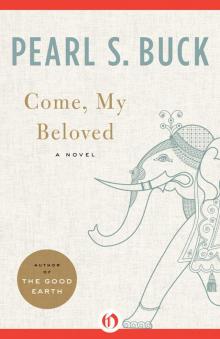 Come, My Beloved
Come, My Beloved The Big Wave
The Big Wave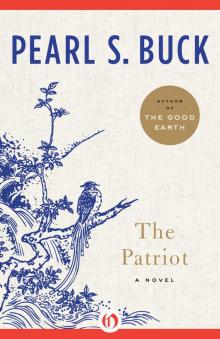 The Patriot
The Patriot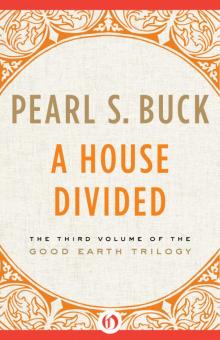 House Divided
House Divided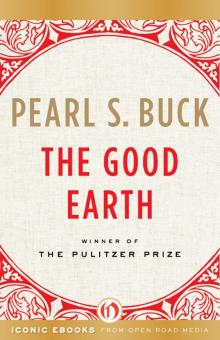 The Good Earth
The Good Earth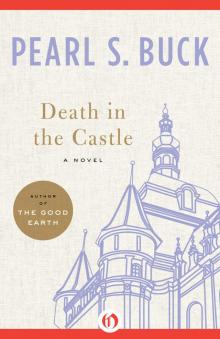 Death in the Castle
Death in the Castle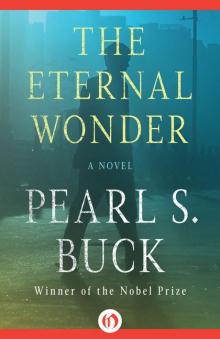 The Eternal Wonder
The Eternal Wonder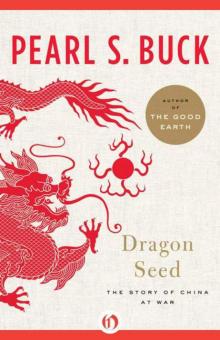 Dragon Seed: The Story of China at War
Dragon Seed: The Story of China at War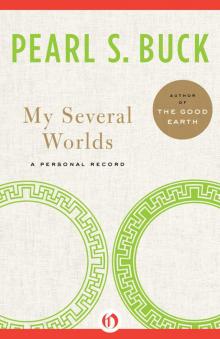 My Several Worlds: A Personal Record
My Several Worlds: A Personal Record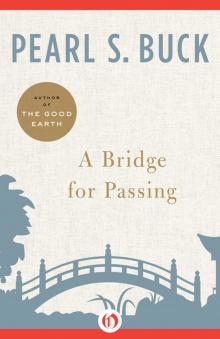 A Bridge for Passing: A Meditation on Love, Loss, and Faith
A Bridge for Passing: A Meditation on Love, Loss, and Faith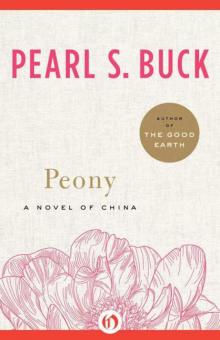 Peony
Peony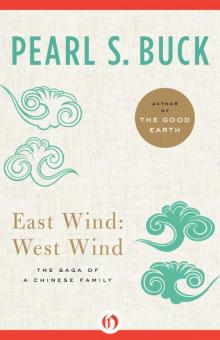 East Wind: West Wind: The Saga of a Chinese Family
East Wind: West Wind: The Saga of a Chinese Family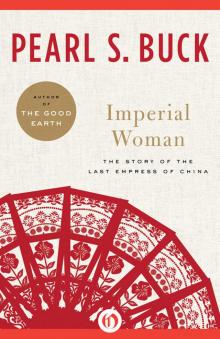 Imperial Woman
Imperial Woman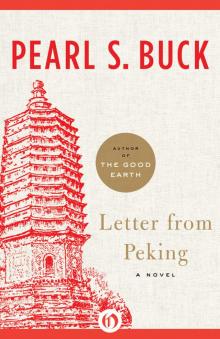 Letters From Peking
Letters From Peking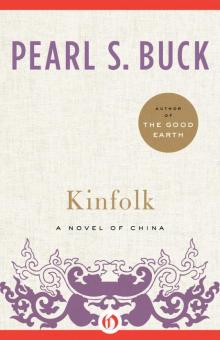 Kinfolk
Kinfolk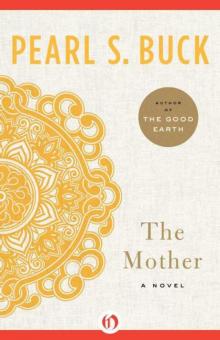 The Mother
The Mother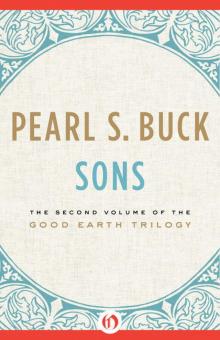 Sons
Sons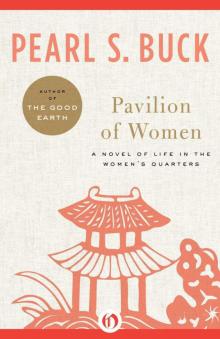 Pavilion of Women
Pavilion of Women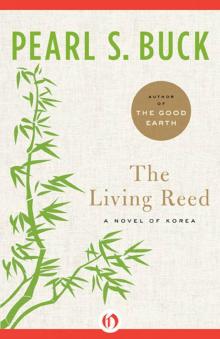 The Living Reed: A Novel of Korea
The Living Reed: A Novel of Korea The Big Wave: A Novel
The Big Wave: A Novel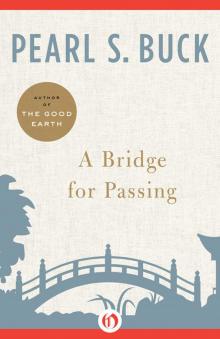 Bridge for Passing
Bridge for Passing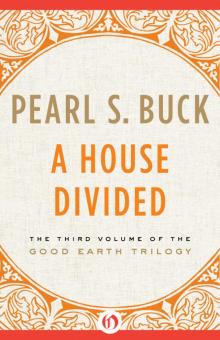 A House Divided
A House Divided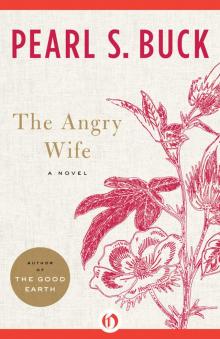 Angry Wife
Angry Wife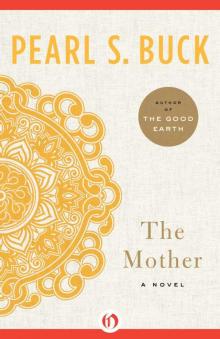 The Mother: A Novel
The Mother: A Novel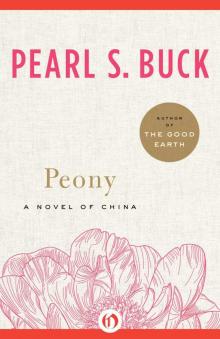 Peony: A Novel of China
Peony: A Novel of China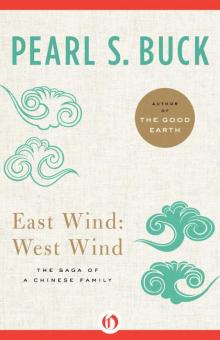 East Wind: West Wind
East Wind: West Wind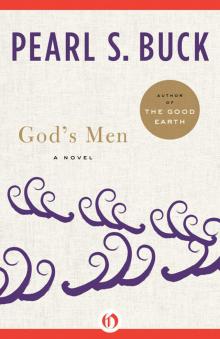 Gods Men
Gods Men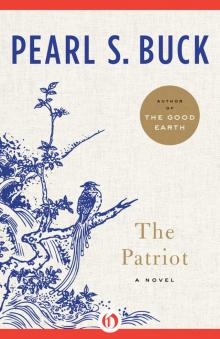 Patriot
Patriot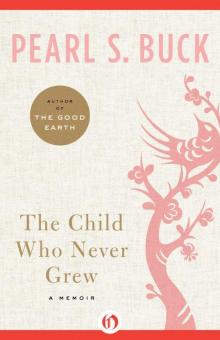 The Child Who Never Grew (nonfiction)
The Child Who Never Grew (nonfiction)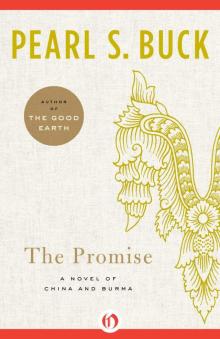 The Promise: A Novel of China and Burma (Oriental Novels of Pearl S. Buck)
The Promise: A Novel of China and Burma (Oriental Novels of Pearl S. Buck)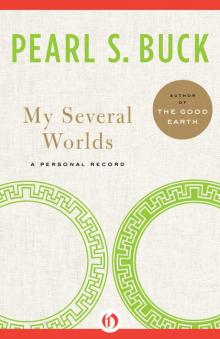 My Several Worlds
My Several Worlds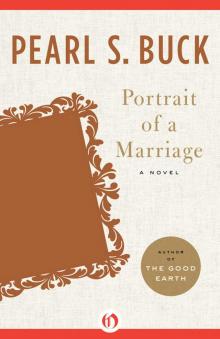 Portrait of a Marriage
Portrait of a Marriage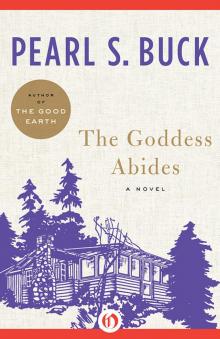 The Goddess Abides: A Novel
The Goddess Abides: A Novel Hidden Flower
Hidden Flower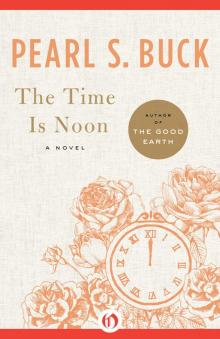 Time Is Noon
Time Is Noon